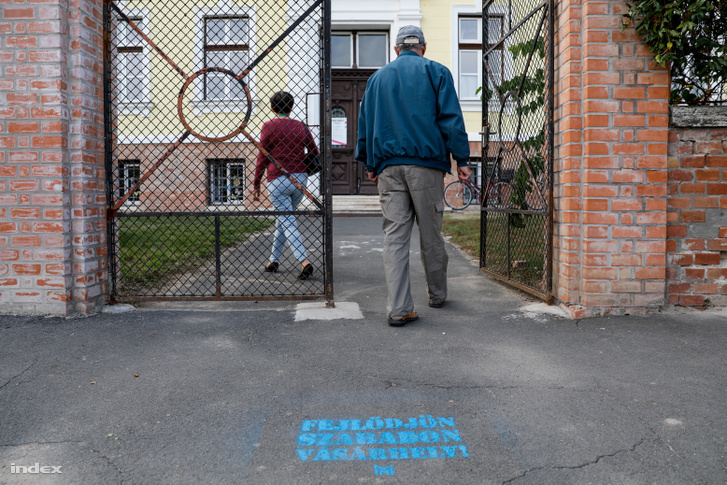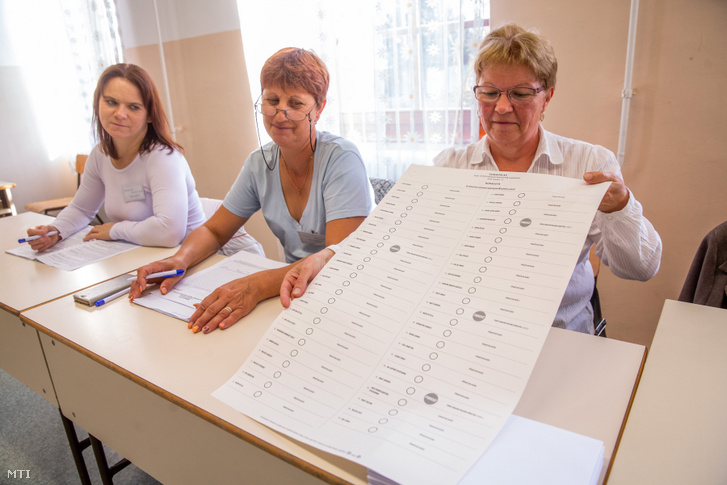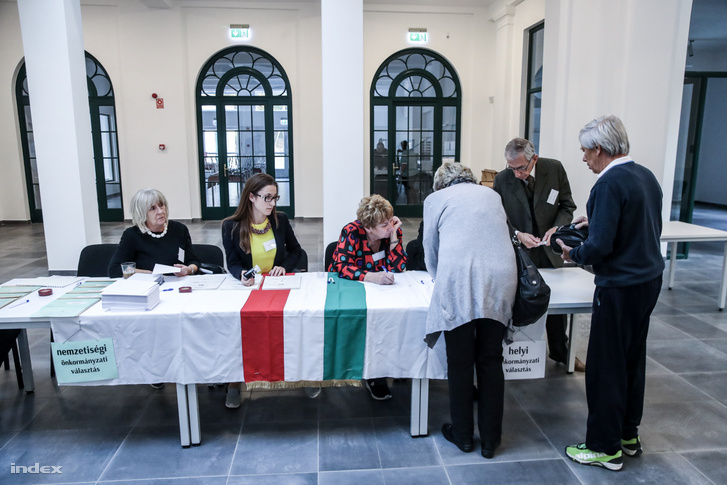
Municipal election in Hungary, as it happened
Municipal elections - Opposition wins Budapest and makes advances in cities, Fidesz retains countryside


In the south-east Hungarian town of Hódmezővásárhely, where around 44 000 people reside, turnout is extremely high, at 3:00 PM, it was:
50.5%.
At the municipal elections in 2014, turnout at three was less than half of this, as voter activity in municipal elections had been decreasing in Hódmezővásárhely in recent years, here are the 3:00 PM turnout figures from the last three municipal elections in the city:
There are two mayoral candidates in race for Hódmezővásárhely: Fidesz's István Grezsa and incumbent Péter Márki-Zay, backed by the opposition. Here, Fidesz is attempting to take revenge for the 2018 hit they have taken at the by-elections held after the decease of the town's mayor, István Almási (Fidesz).

At the 2018 by-elections, Péter Márki-Zay, as sort of a proof-of-concept for the opposition alliance, managed to beat Fidesz's candidate Zoltán Hegedűs - who was supported by the ex-cabinet minister and former mayor of Hódmezővásárhely János Lázár, at the height of his power.
There are thirty international observers monitoring the 2019 municipal elections in Hungary, sent by five embassies and an organisation.
The highest number of observers were deployed by the United States Embassy, but there are four French, three Dutch, a Swedish and a Spanish observer registered for the election, and also one person from the National Democratic Institute.
By law, countries and international organisations have the right to send observers to elections to monitor any aspects of the entire electoral process,
Jobbik's spokesperson György Szilágyi held a press conference this afternoon where he told reporters that reports of electoral abuse are constantly arriving to the party. Szilágyi did not specify or even approximate the number of the reports, but mentioned several cases, such as the distribution of free food on Pécs, exchanging food packages for votes in Budapest's XIII. district, and he also said that opposition candidates and polling station commissioners were subjected to physical atrocities, adding: "The high-and-mighty lords of Fidesz do not abstain from the dirtiest tricks just so they can hold onto their power." Szilágyi encouraged anyone to turn to them if they experience similar cases. (MTI)
34.69% of eligible voters had already cast their ballots today,
which is almost at 2006 levels (34.77%), and exceeds the 2014 figure by nearly five percentage points (30.11%).
Budapest is more active than the rest of the country, turnout in the capital is 36.37%.
Voters seem particularly active as the 1:00 PM turnout data shows:
2 134 806 people had visited the polls until one in the afternoon, which is 26.6% of eligible voters.
This fits into the trend observed throughout the day: Willingness to vote is way higher than at the last two municipal elections (2014: 23.53% 2010: 23.68%), but it's still behind the corresponding figure from 2006: 26.98%.
In 125 towns, there are so many candidates that the election offices have to use oversized ballots. These ballots are even hung on the wall so voters can study them and find the candidates they like before entering the booth.
According to the National Election Office, the highest number of candidates running is in Kunágota, a small village in Békés county with around 2600 residents, 49 of whom aspire to be local representatives. Here is what their giant ballot looks like:

One and a half million people had already cast their ballots by 11:00 AM, which represents 18.25% of eligible voters - the turnout at 11:00 is slightly smaller than it was in 2006 (18.53%) but significantly higher than at the previous two municipal elections (2014: 16.5%, 2010: 16.31%).
Sex tapes ofopposition and government candidates, allegations of cocaine abuse, leaked audiofootages of politicians discussing corruption, police investigations, anonymous accusations of economic crimes- nothing was off-limits in this campaign that many say was the dirtiest to date.
Read our campaign analysis here.
A reporter of news channel ATV and a local representative of Jobbik was assaulted in Pécs at 8:00 AM on Sunday when they wanted to check a municipality building from where people could be seen leaving with gift packages. Suspecting election fraud, they tried to enter, but as Péter Szalai, the reporter involved told index, "three burly men" blocked the door who hit the reporter several times, threatened him, and tried to take his camera away while pinning Jobbik's Gábor Gyimesi onto the wall.
Gyimesi told HVG that as a local representative, he wanted to inquire why the municipality building was open on Sunday - he was told that an association rented it to give packages to people who completed a training course. There was cooking oil and non-perishable food items in the bags.
Péter Szalai told Index that police took action and he is still thinking whether or not to file a complaint. "I've had a long career. Not even at the 2006 riot was I hit. I think it is astounding that such a thing had happened in a municipal building."
It's difficult to tell, the scandal of Zsolt Borkai, Fidesz's mayor in Győr was definitely the defining topic of the final week of the campaign. Last Friday, an anonymous blog started publishing pictures and videos about Borkai's yacht trip on the Adriatic sea where he and his confidante Zoltán Rákosfalvy have had sex with prostitutes and allegedly consumed cocaine (though no cocaine can be seen on the photos), supposedly all paid for by illicit gains from corrupt dealings involving Borkai. The scandal grew into a political storm, and even Fidesz's incumbent Lord Mayor István Tarlós had said that Borkai's actions are indefensible and low-class. By Friday, Fidesz's communication was in tatters.
But the big question is how will all of this affect the voters? Heads of major Hungarian opinion polling organisations were less confident than usual about this as they gathered at a conference in Budapest on Thursday evening to discuss their final predictions for the elections and deeper analyses of their data. Here is what they had to say:
Voter turnout at 9:00 AM was just published:
7.2% have voted so far.
In 2014, 6.07%. of eligible voters have been to the polls by 9:00 AM, a little less than in 2010 (6.6%), or in 2006 (7.7%).
We have just received the 7:00 AM voter turnout from the National Election Office. It's still early, however, the most eager have already been to the polling booths.
So far, 1.12% of eligible voters have cast their ballots.
Voter turnout at this hour during the previous municipal elections was 1.06%.

On the 2019 Hungarian municipal and national minority elections, in total, there are
That depends on where they live.
People living in Budapest are electing a Lord Mayor (the mayor of entire Budapest), district mayors (Budapest is divided into 23 districts), and local representatives for their district assemblies. In Budapest's districts and in towns with populations above 10 000, local representatives are elected in a mixed system with single-member constituencies and compensational lists, while in smaller towns, there is a single non-transferrable vote system, practically meaning that constituents can vote for as many candidates from a single list as there are seats on their municipal assembly.
Voters in cities with county rights are electing their mayors, and in the same mixed system described above, their local representatives. There are 23 cities with county rights, the unusual name covers all of the county seats plus a few other towns that gained this status by having populations greater than 50 000 people before 2012 (when this condition for the status was revoked).
People in other towns are voting for mayors, their municipality's local representatives (with mixed or single non-transferrable vote system) and the members of county general assemblies voting for lists in a proportional system with a 5% electoral threshold per nominating party (meaning two parties with a joint list would have to gain 10% to pass the threshold).
At the same time, there are also the National Minority Elections where the 13 officially recognised ethnic minorities of Hungary (Bulgarian, Greek, Croatian, Polish, German, Armenian, Roma, Romanian, Rusyn, Serbian, Slovakian, and Ukrainian) where self-registered members of national minorities get to elect their local and area representatives in minority self-governments.
It's six in the morning in Hungary, which means that the 2019 municipal elections are officially on their way as the polls are now open, and they will remain so until 7:00 PM.
We are starting our live coverage.